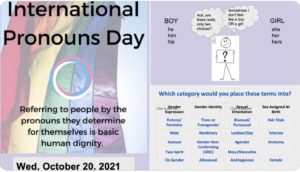Famous Florida law prohibiting sex and gender identity teaching in lower grades faces renewed legal challenges
Opponents of Florida’s new law protecting young schoolchildren from age-inappropriate instruction in sex have renewed their legal fight against it.
The lawsuit by a handful of students, parents,…

Opponents of Florida’s new law protecting young schoolchildren from age-inappropriate instruction in sex have renewed their legal fight against it.
The lawsuit by a handful of students, parents, and teachers from several Florida schools challenging the Florida Parental Rights in Education law was previously thrown out by a judge, but has been amended. The suit alleges the law violates the Constitution as well as Title IX, which prohibits sex-based discrimination by federally funded educational programs.
Wrongly referred to by critics as the “Don’t Say Gay” law, the statute prohibits classroom instruction in sexual orientation or gender identity in grades K-3, and allows only age-appropriate instruction in higher grades “in accordance with state academic standards.” The law became effective July 1.
The lawsuit’s initial complaint was dismissed by Judge Allen Winsor, who said the plaintiffs had not shown the harm they had personally suffered as a result of the law.
“The principal problem is that most of plaintiffs’ alleged harm is not plausibly tied to the law’s enforcement so much as the law’s very existence,” Winsor wrote in his dismissal.
The revised complaint claims the plaintiffs have been harmed in concrete ways because of the statute, including: a decision by the Miami-Dade school board to not recognize October as LGBTQ History Month; the Florida State Board of Education’s approval of a policy to suspend or revoke licenses of public school teachers for younger grade levels should they teach on gender identity or sexual orientation; and another policy from the state board that requires transgender students to use bathrooms of their biological gender unless notice is given to all district parents through the mail and the policy is made available to view online.
Other examples of alleged harm in the new complaint are a student’s inability to enlist a teacher sponsor for a school’s Gay-Straight Alliance, as well as the removal of books containing LGBTQ material from a district’s schools.
Among the named defendants in the suit are five Florida school boards, the Florida Department of Education and members of the State Board of Education.
In the refiled complaint, the plaintiffs argue they’ve been denied “equal educational opportunities they would like to receive, in the curriculum and beyond, and they have been subjected to a discriminatory educational environment that treats LGBTQ people and issues as something to be shunned and avoided, on pain of discipline and liability.”
The state’s lawyers argued in an earlier court document that the law is not motivated by any “animus against LGBTQ individuals,” as noted in a CBS Miami report.
“The bill reflects no governmental preference about what students should learn about sexual orientation and gender identity,” the document reads. “Those subjects must be taught appropriately and, for the youngest children, they may be taught by parents, not in public-school classroom settings.”
This lawsuit isn’t the only legal challenge the new Florida law has faced, nor is it the only time such a challenge has been dismissed by a judge. Another lawsuit argued the law restricted students’ discussions of their LGBTQ families at school. Judge Wendy Berger dismissed the case, finding no facts provided by the plaintiffs to support that claim.



